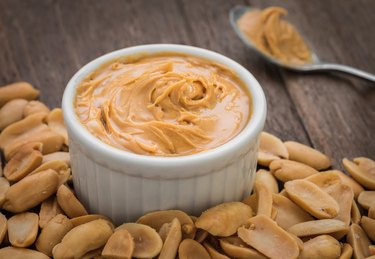
The causes of your indigestion may involve peanut butter, but most likely when other factors contribute to the disorder as well. Fatty foods and overeating can lead to indigestion. Unless you are highly sensitive to peanuts and other legumes, you would have to eat a lot of peanut butter for it to cause digestive problems. Peanut butter contains fat, but mostly unsaturated fat, often referred to as a healthy fat. Peanut butter also has some saturated fat.
Causes
Video of the Day
When you feel full or experience abdominal distress, you probably have indigestion. Bloating, belching, heartburn and even nausea may occur. Eating too fast or eating too much can trigger indigestion, MedlinePlus notes. Fatty, greasy, spicy and gas-causing foods may result in the discomfort. Underlying problems contribute to or worsen symptoms. Stress, nervousness, smoking and drinking excessive amounts of caffeine or alcohol may cause indigestion. Health conditions that may increase indigestion include irritable bowel syndrome, gastritis, inflammation of the pancreas and gastric or duodenal ulcers.
Video of the Day
Peanut Butter Contents
Peanut butter has a considerable amount of healthy nutrients, including fiber, which helps aid digestion and may prevent digestive difficulties when consumed in moderation. A serving, about 2 tablespoons, of peanut butter has about 12 grams of unsaturated fat compared to about 3 grams of saturated fat, according to Dr. Walter C. Willett in an article for the "Harvard Heart Letter." Peanut butter may have health benefits to reduce the risk of heart disease because of the unsaturated fats that help improve cholesterol levels.
Change Your Eating Habits
Particular foods may cause indigestion for certain people. Some people find that high-fiber foods worsen their symptoms. In that case, peanut butter on whole-grain bread may cause digestive problems. It can also depend on the way you eat. Eating a delicious peanut butter sandwich may bring on the temptation to eat too fast, which can trigger indigestion. Take smaller bites and chew your food thoroughly to help your digestive system break down enzymes and avoid indigestion. When you take time to chew foods, you also slow down your eating to avoid overeating. Eating in a calm environment without excitement or arguments, chewing your food carefully and allowing enough time between meals so your food digests properly can help reduce or prevent indigestion.
Points to Consider
When eaten in moderation, peanut butter usually is digested well. However, if you have an intolerance for legumes and develop indigestion or gas when you eat beans, peanut butter may have the same effect because peanuts are legumes, not nuts. Including other fatty foods with peanut butter or overeating may contribute to digestive problems. If you have a peanut allergy you may experience nausea, diarrhea and stomach pain, but not necessarily heartburn and indigestion symptoms. If you experience these symptoms, along with swelling, hives or trouble breathing, seek emergency medical attention.